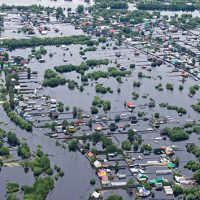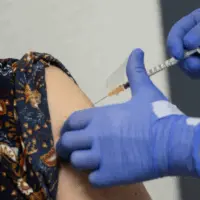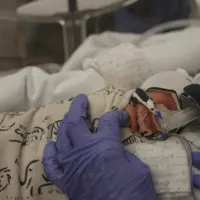
 Artpilot/iStock//Thinkstock(HOUSTON) — As the waves of rain and standing waters of Hurricane Harvey continued to swamp parts of Texas and Louisiana, questions have loomed about the safety of water in the affected zones.
Artpilot/iStock//Thinkstock(HOUSTON) — As the waves of rain and standing waters of Hurricane Harvey continued to swamp parts of Texas and Louisiana, questions have loomed about the safety of water in the affected zones.
Houston Mayor Sylvester Turner tweeted that tap water was still safe to drink. Neighboring city Corpus Christi also lifted their advisory to boil tap water.
But the standing, in some places still rising, floodwaters still pose health risks to residents in the affected areas.
During the deluge that accompanied Superstorm Sandy in 2012, floodwater in parts of New Jersey mixed sewage with drinking water, causing an increase in illness-causing bacteria like E. coli.
Thus far, there have been no reports of any outbreaks of infectious disease in Texas or Louisiana, but health officials may be keeping an eye out in the coming days.
Below is information provided by the U.S. Centers for Disease Control and Prevention (CDC) on precautions to take after a flood:
Avoiding Disease
Contact with floodwater may be unavoidable, but it can come with several health risks. Especially after a flood, water becomes stagnant and starts to heat up, providing an ideal breeding ground for bacteria. For protection, people should wash their hands – as well as the hands of their children – after contact with the water. Any children’s toys or other objects that have come in contact with floodwater should be disinfected before use.
Treating Open Wounds
Floodwaters can often hide hazards that lurk below the surface, which can make getting around treacherous and increase the risk of injury. Plus, they can increase the likelihood that wounds could be exposed to pathogens, such as the bacteria Vibrio vulnificus found in oysters, shellfish and seawater that has the potential to cause life-threatening illness. After a hurricane, there is an even higher risk of exposure to this bacteria as the coastal waters mix with floodwater.
People with compromised immune systems and those with chronic liver disease are particularly vulnerable to this bug. Healthy individuals have a lower risk of developing a Vibrio vulnificus infection, but wounds should be washed with soap and clean water. Both wounds and rashes should be covered with waterproof bandages while floodwaters remain a problem. If a wound becomes red or festering, individuals should take care to seek immediate medical attention.
Keeping Feet Dry
When feet are wet for prolonged periods of time, it is possible to develop a condition known as trench foot. After being wet for a long time, feet can become tingly or itchy and then become painful or start to swell. The skin on the feet can then blister, leading to the tissue dying and falling off.
To avoid trench foot, people should clean and dry their feet after wading through flood waters and change their socks regularly. Socks should not be worn while sleeping.
Feet that appear to be affected can be soaked in warm water for five minutes. If symptoms do not improve, medical attention should be sought.
Other Hazards
Regardless of swimming ability or shallow depths, floodwater increases the risk of drowning. Children should never play in the floodwaters and people should not attempt to take refuge in vehicles, which can be swept away or stalled by the water.
Stagnant water can also act as a breeding ground for mosquitoes, so people should use insect repellent whenever necessary and be aware of any increased reports of mosquito-borne illness in the coming weeks.
Murky floodwater can also contain chemicals, reptiles and pieces of glass or other sharp objects. Downed electrical wires can also be an electrocution risk.
Copyright © 2017, ABC Radio. All rights reserved.














